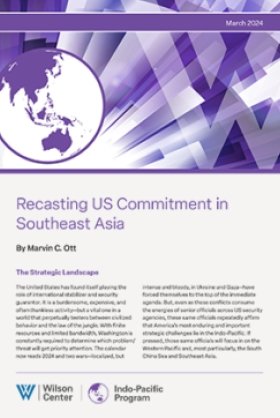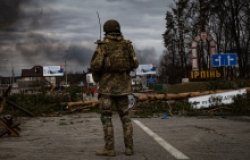Four Illusions About Syria That the U.S. Has to Abandon
"When it comes to the Middle East, giving up illusions is mandatory. As Secretary of State John Kerry prepares for another round of talks with Russia, Iran, and Europeans on Syria’s future, here are several illusions the Obama administration must abandon," writes Aaron David Miller.
When it comes to the Middle East, giving up illusions is mandatory. As Secretary of State John Kerry prepares for another round of talks with Russia, Iran, and Europeans on Syria’s future, here are several illusions the Obama administration must abandon:
Bashar al-Assad must go. The Russians would drop Mr. Assad if they could find a transitional process that preserved their influence in Syria and avoided a U.S.-brokered solution. Both are unlikely; Vladimir Putin will argue that the real target should be Islamic State and any Islamist opposition that would weaken the Assad regime and facilitate the jihadis’ rise. Mr. Putin has two objectives right now: settling scores with ISIS and its affiliates for the Russian airliner downed recently over Egypt, and bucking up the Assad regime. The politically inconvenient truth is that if the Obama administration wants to press for Mr. Assad’s removal, it needs to ensure, somehow, that ISIS doesn’t fill the vacuum. Mr. Assad is a murderer, but he’s not actively targeting Americans or Russians. ISIS, by contrast, is a direct threat to the U.S.
Russia is ready to deal. The whole point of Mr. Putin’s military gambit in Syria is to enhance Russia’s prestige—not diminish its influence—and to prevent another Libya, whereby the U.S. snookers Moscow into accepting an intervention that eliminates a Russian ally. If you’re a controlling Russian leader who believes deeply in order and the authority of the state, dislodging fellow authoritarians hits too close to home. Mr. Putin might be amenable to a deal–but on terms that makes his intervention worthwhile and leaves Russia and its regional allies, including Iran, in a position of influence. Mr. Putin won’t be chased out of Syria, and he’s got more time left in office than Barack Obama does to maneuver in Syria.
The politically inconvenient truth is that if the Obama administration wants to press for Mr. Assad’s removal, it needs to ensure, somehow, that ISIS doesn’t fill the vacuum.
Syria can be saved. The notion that Syria could be fixed anytime soon through some sort of diplomatic process is an illusion. The reality: 11 million Syrians have been internally displaced or become refugees, at least 250,000 are dead, scores of thousands more have been wounded and traumatized, and ISIS controls a third of the country. The final communiqué of last month’s meeting in Vienna called for a new constitution and elections and declares that Syria must be resolved by Syrians. Yet there were no Syrians at that meeting, and the odds are poor of creating a coherent opposition out of Syria’s myriad factions and militias, many of which have local interests and external patrons. Even reconstituting the Syrian state in a highly decentralized form would require a probably impossible degree of consensus among internal sects and for all the external actors to be on the same page. Consider: Kurdish militias that pushed ISIS out of parts of northern Syria are setting up their own autonomous region based on the anarchic philosophy of the Kurdistan Workers’ Party (PKK).
Iran won’t deal. It is unlikely that the mullahs, having invested billions in Syria and worried about being encircled by Sunnis, will cooperate in any settlement that doesn’t protect Tehran’s interests, including the ability to maintain ties to Hezbollah in Lebanon and a friendly regime in Damascus. Bashar Assad will never again control all of Syria, and a Sunni-dominated successor regime might be openly hostile to Tehran. That leaves the possibility of a decentralized or partitioned Syria where Mr. Assad or some other Alawite leader controls a rump state with Iranian backing. It seems highly unlikely, given the mutual suspicions between Washington and Tehran, that Iran would agree to a Syrian settlement that has it openly abandon Mr. Assad or Hezbollah under U.S. pressure. Indeed, the U.S. has all but abandoned its conditions for Iran’s participation in the Vienna process.
Maintaining these illusions publicly may be useful to U.S. diplomacy and keeping some political process alive. But we can’t still, or start to, believe in them. The Obama administration has a year left; the odds of a settlement by 2017, even setting into motion a credible transition process, are low. For now the key U.S. objective in Syria should be counterterrorism: keeping ISIS and its affiliates on the defensive, backing local forces with air power, and hitting jihadis before they hit us. That downed Russian airliner underscores that the ISIS threat has morphed into one against commercial aviation. The U.S. is surely high among the targets.
The opinions expressed here are those solely of the author.
This article was originally published in the Washington Wire.
About the Author


Middle East Program
The Wilson Center’s Middle East Program serves as a crucial resource for the policymaking community and beyond, providing analyses and research that helps inform US foreign policymaking, stimulates public debate, and expands knowledge about issues in the wider Middle East and North Africa (MENA) region. Read more










